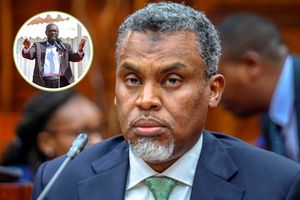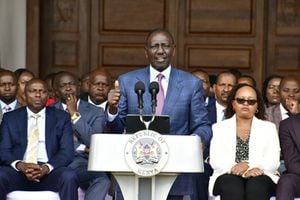Waivers, VIP culture and impunity

The presidential motorcade arrives at Ulinzi Sports Complex during the memorial service and military honour of the late CDF General Francis Ogolla at Ulinzi Sports Complex, Nairobi on April 20, 2024.
What you need to know:
- In every community, rules are invariably made by the elite.
- VIP culture severely undermine endeavours to build a strong state.
The imperatives of law and order are indispensable components of every society's political sustainability.
This is because by definition, the idea of society itself arises whenever human existence ceases to be a solitary affair.
Society implies others, which is the foundation of the political, that interface of the private with the common, and the intersection of individual and public interests.
In other words, if two or more persons are to subsist without running the risk of violent mutual decimation, a modus vivendi dedicated to mitigating conflict, conducing individual felicity and facilitating collective efficiency, is absolutely unavoidable.
Howsoever articulated, the dos and don’ts of human coexistence are vital institutions that obligate all in order to propitiate all.
Thus, to be effective, society's institutions must draw their legitimacy from mandatory universal application in the sense that they bind all eligible persons without discrimination.
Irrational exemptions
Owing to the foregoing, the practice of maintaining irrational exemptions from compliance, explicit or otherwise, essentially constitutes direct sabotage of the political community, and a fundamental ingredient of pernicious impunity and intractable disorder.
An exemption is irrational when its beneficiary’s exceptional capabilities to meet or exceed the eligibility criteria for compliance are either ignored or perversely leveraged to create privilege, with the consequence that those who should find no trouble complying are granted the carte blanche not only to evade compliance, but often, to openly and publicly violate the rule in other ways.
The nation’s universal disgust upon learning that two banks — organisations reflexively associated with the phenomenon of ‘super-profits', which thrive regardless of ambient economic vicissitudes — had sought, and been granted, exemption from paying taxes due as a consequence of their merger, indicated our political community's visceral revulsion in the face of a spectacularly public instance of antisocial behaviour by the highly privileged.
Public outrage was further intensified by the fact that at material times, the ownership of the entities was linked to a serving top public official, who is the scion of a wealthy and privileged clan.
On a similar register in terms of potential to incite hearty public disapprobation is the incorrigibly delinquent penchant by VIPs, or senior elites in our public sector who, upon elevation acquire a sudden and intense appetite for impunity, to wantonly disregard the mores of harmonious coexistence, peace and order, and to flagrantly violate normal expectations of personal responsibility, public accountability and obedience to the rule of law.
Violate basic rules
What else accounts for the open indifference by our elites to such elementary norms as the Highway Code?
What accounts for the impunity with which they visibly, actively, loudly and publicly violate basic rules in the full view of fellow citizens, who are not patiently submitting to the same rules at immense cost and inconvenience, but are also horribly prejudiced by the reckless and inconsiderate rampages of their betters?
In every community, rules are invariably made by the elite, be they divinely mandated autocrats or sovereign representatives, in conjunction with their political associates and accomplices.
It may be assumed that these elites perceive some advantage in promulgating various edicts, and that they perceive themselves as agents acting within, not outside the political community, for whom the feasibility and desirability of compliance matters.
This is to say that, unlike the regimes of colonial and slave political economies — whose institutions were designed for the explicit purpose of expropriating and enslaving one segment of the political community for the benefit of another — it is reasonable to assume that when our elites make rules, they expect to be bound by them and intend to submit to them.
Representative democracy implies that our leaders shall make rules in our name, and therefore, shall make only those rules whose universal enforcement enhances our collective interests.
Elite delinquency
To make rules and subsequently devise arrangements for the most capable among us to disobey them, fundamentally contradicts the purpose of government.
First, elite delinquency is the most flagrant advertisement of a prevalent catastrophic failure of representation: the divergence between the needs of the people and the interests of their leaders underscores a fundamental conflict about the nature and purpose of the political relationship.
Secondly, and related to this, elite effort to evade compliance calls into question the fairness of the rules they make.
Far from enhancing prestige and eliciting admiration, VIP culture — the shock-and-awe exhibitions of material and behavioural signals of privilege, accessories of power and accoutrements of status, including the juvenile insistence on jumping queues or being driven on the wrong lane at peak traffic hours, entitlement to irregular facilitations to access rewards and benefits otherwise exclusively reserved for the deserving best and brightest, and other refractory conduct — severely undermine endeavours to develop coherent institutions and build a strong state.
More than anyone else, our elites should recognise the benefit of our institutions, and take the lead in personally complying, and ensuring that everyone else complies with them.
The fact that they see delinquency as prestigious is a horrifying moral tragedy which confirms our worst fears: state failure is an inside job.
The writer is an Advocate of the High Court of Kenya





